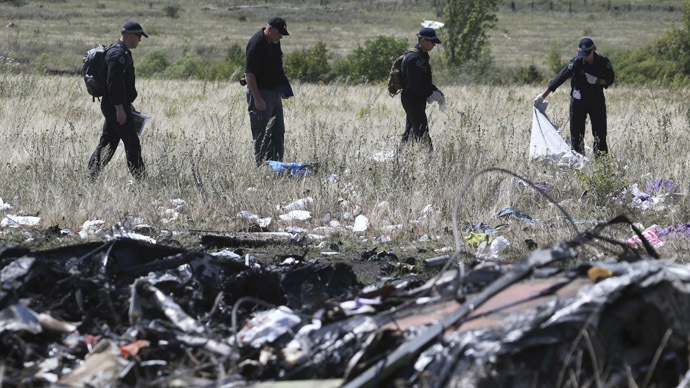The report on the downing of MH17 above Eastern Ukraine is preliminary, and the idea is to bring any problem that might cause another accident to the attention of the authorities, former pilot and aircraft safety controller Desmond Ross told RT.
RT:Let's pick up on that last bit in the radio transcript – what "target" are they talking about?
Desmond Ross: A radar target, I think in this case. The blips that we are familiar with on the radar screens they are always referred to as a target. It doesn’t have any military implication.
RT:The report states the Dutch experts were only examining the photographs, but haven't seen the debris itself at the crash site. Does this raise questions over the report's credibility?
DR: They are doing the best they can in the circumstances, given the war that is in progress in the crash site area. It is much better if they can get to the site, I think that ultimately they will. It is much better if the parts can be removed so they can be properly analyzed in a laboratory, in a clean environment and a hangar, but for the moment this is the best they can do. There have been some people at the site and those photographs have been taken by these OSCE investigators who actually visited the site.
RT:At the time of the crash the Russian government raised itself a number of questions, for example why Kiev was so fast to blame self-defense forces or why the plane was going through a conflict zone? Can we say that report isn’t conclusive as it gives no answers to any of these questions?
DR: It does not give the answers to it, but it does address the question. The airspace has been closed below 32.000 feet, the aircraft was flying at 33.000 feet, so theoretically it was in a safe area above what was considered to be a conflict zone. That’s all very well, but in hindsight it proves to be incorrect. As the result of that, there have been high-level meetings held in Montreal at the international civil aviation organization, with all the stakeholders and all of this has been reviewed. That method of providing for clearances above the conflict zone is not really going to be acceptable in the future and it was clearly incorrect in this case.
RT:Everybody in the world has been waiting for the explanation of what really happened on that tragic day. We have been waiting for seven weeks. Do you think this report is an adequate result for such a lengthy investigation?
DR: Preliminary reports – the word preliminary is an operative word, taken that the crash site is in the war zone that is the best they can do at the moment. It is a requirement and a preliminary report should be issued for a larger crash of this type and the idea of it is that there is an outstanding problem, something that might lead to another accident then it is brought to the attention of the world’s authorities, so that something can be done quickly about it. The fine detail will be brought out during this next year or two as they hopefully get into the crash site and analyze the crash debris at the much better level. For the moment that is quite an acceptable report, but it is not conclusive.
The statements, views and opinions expressed in this column are solely those of the author and do not necessarily represent those of RT.
The statements, views and opinions expressed in this column are solely those of the author and do not necessarily represent those of RT.

